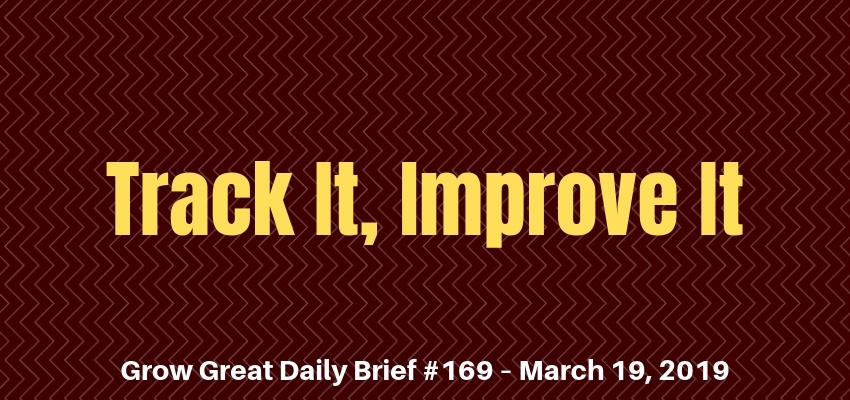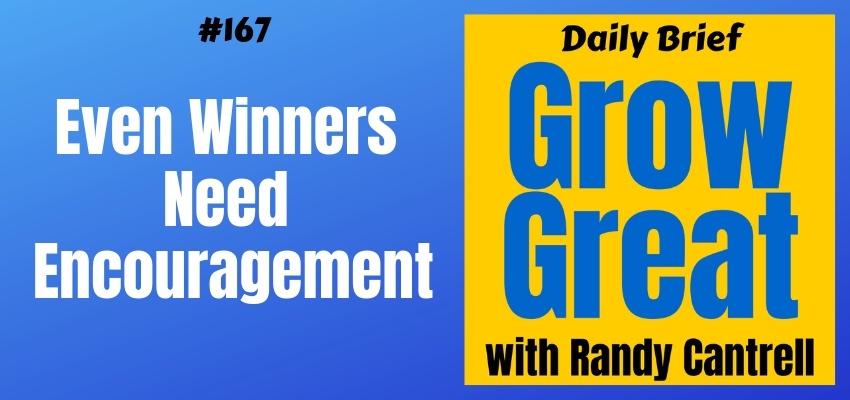Don’t Let Someone Have The Upper Hand – Grow Great Daily Brief #170 – March 20, 2019
Podcast: Play in new window | Download (Duration: 12:15 — 12.4MB)
Subscribe: Apple Podcasts | Spotify | Email | RSS | More
Tap the brakes. I’m not talking about you domineering everybody in your life. And I’m not talking about how wonderful people are who refuse to submit to anybody over anything at any time. I’m talking about the most dreaded factor in our daily lives.
FEAR
Business owners – excuse me, entrepreneurs – often feel like they’re supposed to be immune. It’s like we all lined up at some secret clinic and got vaccinated with a vaccine unavailable to ordinary folks. That’d be great, wouldn’t it?
Culture presses on us unprecedented glorification. In my lifetime I’ve never seen business ownership or business startup glorified more. It’s the grand panacea for what ails you. Start your own company and all your wildest dreams will come true. Leave your 9 to 5 and enter the land of Utopia.
The reality is very different. Statistically, most don’t make it. Failure rates are extremely high. That doesn’t mean we shouldn’t go for it. It just means culture paints an unrealistic picture that sets very unreasonable expectations.
For those already in the game, it can press us to think, “My life isn’t like that. What’s wrong?” The average business owner isn’t living an Instagram kind of life. Fear is real. Fear that we’re failing. Fear that we won’t find success. Fear that we’re not as successful as we should be. Fear that we’re not measuring up.
Thankfully, there is an increasing volume of attention being given to the mental and emotional health of entrepreneurs. It’s a far cry from being able to offset the negative, fictionalized viewpoints, but it’s a start.
Do a Google search for the word “fear” and here’s what you get…
About 1,230,000,000 results (0.58 seconds)
The first results are definitions. Mayo Clinic defines fear as…
An unpleasant feeling triggered by the perception of danger, real or imagined.
But Merriam-Webster defines it as…
fear is the most general term and implies anxiety and usually loss of courage. fear of the unknown dread usually adds the idea of intense reluctance to face or meet a person or situation and suggests aversion as well as anxiety.
I’ll join the many who refuse to look at fear as the absence or loss of courage. That just adds to the negative pressures and imposes on us an unhelpful viewpoint.
It’s shallow to think that courage can’t coexist with fear because courageous people often confess their fear. Look in the mirror. You’ve exercised courage before. And you’ve done it in spite of fear. Courage is more likely doing what we need to do – or what we should do – anyway. In spite of fear or any other threat.
Let’s narrow our fear focus this morning. Let’s take aim at an action that has grown increasingly fascinating to me for the last few years – judgment.
Judgment
I’ve grown fond of a statement that I think is so ridiculously accurate. There are variations of it and I don’t claim to have originated it, but it’s brilliant and I rather wish I had.
just because you came into this chapter of my life doesn’t mean you know my whole story
But people think they’ve got it all figured out. We may think we’ve got others figured out. We judge each other. Easy to do because we’re not living their life. So we can second guess everything they do. And enjoy it.
That’s a real fear. A really big fear. Fear that people will judge us. Think less of us. Not be impressed by us. Blah, blah, blah.
Guess what?
They’re doing that now about you. And they’ll keep doing it. It doesn’t matter. Here’s what matters – how much headspace you’re willing to give to it. That’s why I’m becoming a more devoted convert to another truth.
Fear comes from a willingness to let someone else have the upper hand in judging you.
Why?
Because we’re human. Because we want to fit in. Because we want to be liked.
Even if it’s with and by people who don’t matter to us. 😉
Unreasonable? Sure. Completely.
But you’re mindful of your lifestyle in large part by how you look to others. If you want to own a multi-million dollar home with 12,000 square feet, then good on you. If you want to own a 1,400 home with a small yard and back patio where you can grill in the summer, then good on you. Truth is, neither one impacts me one little bit. If so, how?
Drive a $250,000 Bentley. Bully for you. Drive a Toyota Corolla, good for you. What you drive impacts me how? It doesn’t. Well, unless we’ve got a meeting and your car won’t start making you late or absent from our appointment. 😀
Passing judgment is indicative of people’s willingness and the duration, too. It’s passing. So why not let it pass without giving any oxygen to it?
Don’t admire anybody enough to take their point of view about you as more valuable than your own.
But we often do. It stymies us. Cripples us. Why?
Because these people came in on this chapter of our lives and we’re now going to let them write our complete story? How ridiculous!
Because that person judging you is somebody who is in your life for mere minutes (if that), and we give them the upper hand in making an assessment on our total life? Crazy, right?
Don’t listen to opinions that don’t matter.
What makes you happy with your business? What revenue goals excite you have nothing to do with me, or anybody else. Ditto for your lifestyle. Live as frugal as you want or as extravagant as you want, makes me no bit of difference. If so, how? And even if I judge you harshly – which is the tendency of many – what difference does it really make? Answer: it makes no difference unless you let it.
Unless you let it
Today, I’m encouraging you to not allow the judgment of anybody else to sidetrack you. Don’t give it any attention at all.
Examine yourself. Learn all you can about yourself and your circumstance. Seek understanding. Yes, solicit the perspective of people willing and able to help you. Perspective isn’t judgment. It’s a service from others that helps you eliminate your blind spots. Then grow! Make changes to improve. Forget what people think about you, your business or your choices. Your growth doesn’t depend on what others think of you.
Be well. Do good. Grow great!
RC
Don’t Let Someone Have The Upper Hand – Grow Great Daily Brief #170 – March 20, 2019 Read More »





